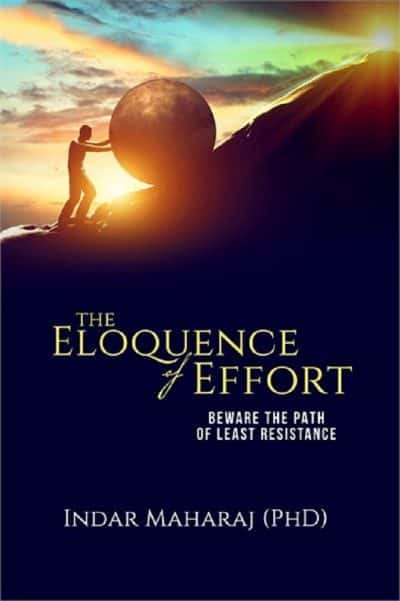Description
The Eloquence of Effort discusses the multiple rewards of hard-work. A boring subject, you snarl. But do read on and you may be pleasantly surprised.
Life’s problems are spontaneous: unpleasant things just happen. On the other hand, the solutions to problems demand energy and effort. Left unattended, difficulties always worsen and finally degenerate into insoluble chaos. Have you ever wondered why things always break up, breakdown, degenerate, depreciate or simply fall apart? And why do we have to grow old? Why not the other way around? Have you ever considered what would happen if you abandoned two cars, an old and a new, and revisited them 50-years later? That´s simple, you say. The new would deteriorate and the old will probably disintegrate into dust. That´s just the way things are, you exclaim. But why not the reverse? Just as the new one aged into a rusted rattle-trap, why didn’t the old one return to a spanking new drivable car? Undoubtedly, the question is a legitimate one.
The idea stirs the imagination and compels the realization that effort is never wasted. Moreover, corruption in all its fiendish forms is indolence disguised as diligence. Analysis of biographical data sustains the claim that hard work prolongs life; indolence truncates it.
These findings and answers to the questions posed above are due to the forces governing Second Law of Thermodynamics, sometimes referred to as the Law of Entropy. According to this Universal Law, the purpose of life is to apply our energy to combat the tide of entropy that threaten to submerge the orderliness of our daily lives. Failure to do so results in our property, our investments and our lives falling apart





I enjoyed reading “The Eloquence of Effort: Beware the Path of Least Resistance,” by Indar Maharaj and found it to be an intriguing, highly organized, and logical presentation of the benefits of hard work and diligence. And, in my opinion, the book also excellently shows the consequences of taking the easier or less resistant road in life.
I liked the way this highly intelligent author gives clear examples of the lives of people like Bill Gates, Mother Theresa, Dr. Albert Schweitzer, and other successful persons and points out certain things and aspects in their lives that led to the great contributions they made to the world.
For example, the author writes in depth about these high achievers and their nature and characteristics, and here is a brief excerpt about Schweitzer,
“The benevolent Doctor was both frugal and dynamic. The challenge of setting up and managing a hospital defied administrative wizardry. To conserve monetary resources, he would not as much as repair his piano channeling the money instead to the needs of the hospital. Shaving without the balmy benefit of soap and third-class travel became routine practices. To economize on stationery, Schweitzer utilized every scrap of paper, filling his note pads completely and adopting a tiny penmanship. Self-abnegation became an obsession.”
The author goes on to point out that although the path was difficult with many setbacks, the results were,
“Despite all its setbacks, the Hospital at Lambarene stands in proud recognition of the altruistic vision of Dr. Albert Schweitzer. Today, it is a cutting-edge institution on the African continent. The Medical Research Unit of the Albert Schweitzer Hospital, one of the leading scientific and clinical facilities in Africa, works steadfastly towards ending the scourge of malaria. The hospital also serves as a prestigious training campus for African physicians and scientists.”
Then he goes on to show examples of those who took “easy ways” or what they felt were “smarter ways” to get through life such as Bernie Madoff, Pablo Escobar, Enron Corporation, and other nefarious persons.
He writes in depth about them and for example about John Gotti,
“As dastardly nauseating as it may sound, his adult life’s work was succinctly summed up in his own words. When asked his purpose at the Ravenite Social Club, Gotti chillingly replied when we are not shooting people we play cards. He failed to mention some of his other criminal exploits such as narcotic trafficking, extortion, illegal gambling, pornography, union racketeering, robbery, business shakedowns, auto theft, and loansharking.”
And the author later points out in detail what happened in an easy come, easy go theme for the “Man who had it all”,
“His final ten years surpassed his worst nightmares. He was placed in solitary confinement for 23 hours per day in the harsh confines of Marion, Illinois, known as one of the most punitive of prisons in the United States. It serves as an ideal environment of retribution for irredeemably vile criminals. With nothing more than a small thirteen-inch black and white television set and a slab of concrete for bed, Gotti’s life was the embodiment of woe. His cell was described an above ground grave. But the worst was yet to come…”
I also like the way the author writes at a steady pace that kept my interest while bringing in new concepts and ideas that made me pause and reflect upon what I had just read. And that all made me enjoy this unique book which I found exceptionally interesting.
Also, the author writes in a penetrating style focusing on the concepts he is discussing while revealing new ways of looking at things giving the reader viewpoints that stayed with me.
I also believe this is one of those books I want to read a second or third time. There is a lot to learn and refresh ideas and concepts in this book. It is also fully referenced, and this excellent author worked extremely hard to write it — just as his title suggests.
All and all, I felt this is a book everyone needs to read especially when faced with crossroads in life, choosing a career, or anyone who is faced with a major decision in life. Also, in my view, this is an extraordinary work that also provides reinforcement for anyone who ever has any doubts about choosing the difficult and straight and narrow road in life, especially when those around you seem to be taking the wrong road through life.
The author goes on to connect concepts of hard work, while sincerely and honestly pursuing the path one chooses to follow in life with thermodynamics and shows how that produces real joy in life.
Very well done, unique, and highly recommended!
It was my pleasure to receive a free copy of this book but that does not in any way affect my opinions in this review of this exceptional book.